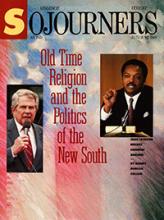For God so loved the world that God gave God's only Son, that whoever believes in him should not perish but have eternal life.
-- John 3:16
This verse, John 3:16, is the first from my church background that I remember learning by heart. And the story of Nicodemus (John 3:1-17) going to visit Jesus has remained central to me.
Nicodemus is generally not a very sympathetic character in this story. He was a Pharisee, a rich aristocrat, a ruler -- not the kind of person with whom most of us would identify. And yet maybe there's more than we can see, and more of ourselves in Nicodemus than we think.
In Nicodemus' time, Pharisees were thought to be the best people in the country. There were never more than 6,000 of them. They were called the chaburah, the brotherhood, which was a large, select community.
Pharisees entered their community by pledging in front of at least three witnesses that they would spend all of their lives observing every detail of the scribal law. And to Jews the law -- the first five books of the Hebrew Testament -- was the most sacred thing in the world. They believed the law was the perfect Word of God, containing everything they needed for living a good life.
Now, at first the law was a number of great principles or themes that one had to work out for oneself. The principles were there, but how they were lived out was something that each one had to decide for themselves. But later an infinite number of rules and regulations, extracted from the principles of the law, emerged to govern every conceivable situation of life. The law of great principles had changed into a legalism of bylaws and regulations.
Probably the best example of this is the elaboration of the Sabbath law. In the Bible we are simply told that we must remember the Sabbath day and keep it holy, and that on that day no work must be done by people or by animals.
Read the Full Article

